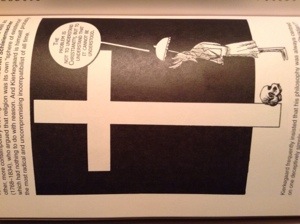This is a short essay I wrote on Soren Kierkegaard, the Danish philosopher, as regards absolute truth versus relativism. His belief in Christianity and his simultaneous opposition to it demonstrates an internal conflict between the relative and the absolute. That is, the relative truth is appealing to the world of the senses, allowing one to feel free in his or her own skin. But the absolute is another thing entirely: it requires the sacrifice of the individual self in service to the universal consciousness! To realize the absolute, Kierkegaard points to the example of Socrates and his “daimon,” or guiding spirit. In this way, relativism and absolutism can coincide, in the form of individual, god and the resulting “truth” produced.
Kierkegaard’s Faith
My Philosophy
The question Kierkegaard asks is, “how should I act”. Socrates asks the similar question, “how should I live”. The difference between acting and living? Acting is in service to the self while living is in service to others. Does this make Kierkegaard a selfish philosopher? Evidently, though what he was aiming for was a selfless life.
This service to the private rather than the public appeals to me because I, like Kierkegaard, am a private individual. While I wish I could be more of a public gadfly, like Socrates, my gift is one of drama and thought, like Kierkegaard. Does this mean his mission is the same as mine? No. He took Socrates for his model because of his maieutics and irony. I take Kierkegaard as my model for his theatrics and service to Christ.
What about the daimon? Socrates believed he had a mission from the gods, that is, to find out what is meant by wisdom. Kierkegaard’s very different mission was to point out hypocrisy and reform the church through a Socratic, self-examined life. My mission is to understand my inner daimon through a life devoted to the arts. Why the arts? Because that is where both my interests and my strengths lie. Just as Socrates and Kierkegaard had their strengths, I have mine.
So why is Kierkegaard an ideal model? Not so much because of his mission or daimon, but more so, because of his temperament and lifestyle. He tried to reconcile the Kierkegaardian curse invoked by his father with the piety of his brother, a self-imposed thesis, antithesis and synthesis. My synthesis is a dialectic between eastern and Western thought, between Buddhism and Christianity. What is at the heart of this matter? I think I am asking the question, “what should I be”! Identity is at the core of myself and my country.
I am not a prophet or superman. I am a mediator, a peacemaker, an ambassador. I speak for godspirit, my daimon, which is both a blessing and a curse. But ultimately, I believe. Not because I am good or true, but because I choose to. This is Kierkegaard’s active life in the spirit.

